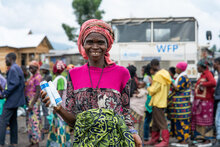Canada Provides CAD$50m For Unique 5-Year Integrated Resilience Program By UN Agencies
ROME – The United Nations’ food and agriculture agencies are embarking on an unprecedented joint programme to work with vulnerable communities in three crisis-prone areas over five years to meet their immediate food needs and boost their resilience, while addressing the root causes of food insecurity.
The US$38 million (CAD$50m) initiative funded by the Government of Canada, will be rolled out in the Democratic Republic of Congo, Niger and Somalia by the Food and Agriculture Organization of the United Nations (FAO), the International Fund for Agricultural Development (IFAD) and the UN World Food Programme (WFP).
While the three Rome-based agencies collaborate closely in many countries, this is the first time that they have received joint multi-year funding for resilience work. The communities receiving support will remain constant and will all be within the same geographic area; in Somalia in the Togdheer region which has been facing near famine conditions as a result of drought and conflict; in Niger, in the Maradi and Zinder regions which are exposed to weather and climate shocks; and in the Democratic Republic of the Congo, in the Kivu, torn by recurrent conflicts in recent years.
The joint programme aims to sustainably increase food security and strengthen the resilience of vulnerable families with a specific focus on women and children, through actions led by national governments and local communities.
“This significant investment in resilience is also an investment in ending hunger,” said FAO Director-General José Graziano da Silva. “By strengthening livelihoods, communities will better withstand protracted crises, disasters and conflicts and can rapidly recover.”
“IFAD's investments increase the resilience of rural people, including in fragile areas and protracted crises situations where hunger and poverty run deepest,” said IFAD President Gilbert F. Houngbo. “The Rome-based agencies remain firmly committed to working together by linking and complementing our operations to achieve the 2030 Agenda.”
"This smart stewardship by Canada raises the bar on how we approach resilience programmes together. This will deliver maximum results in transforming the lives of people on the margins," said WFP Executive Director David Beasley.
Canada’s generous financial support up front will allow the agencies to better synchronise their activities from the outset, through a tried and tested consultative planning process where local people are at the heart of decision-making. The impact of this integrated approach will be closely monitored against a resilience index.
Follow us on Twitter : @WFP_Media @IFADNews @FAONews @Canadadev
# # #
FAO leads international efforts to defeat hunger. FAO assists developing countries and countries in transition to modernize and improve agriculture, forestry and fisheries practices and ensure good nutrition for all.
IFAD invests in rural people, empowering them to reduce poverty, increase food security, improve nutrition and strengthen resilience. Since 1978, we have provided over US$17.6 billion in grants and low-interest loans to projects that have reached about 459 million people. IFAD is an international financial institution and a specialized United Nations agency based in Rome – the UN’s food and agriculture hub.
WFP is the world's largest humanitarian agency fighting hunger worldwide, delivering food assistance in emergencies and working with communities to improve nutrition and build resilience. Each year, WFP assists some 80 million people in around 80 countries. Follow us on Twitter @wfp_media
For more information please contact:
FAO: Zoie Jones, FAO/Rome Tel. +39 06570 56309 Zoie.Jones@FAO.org
IFAD: Katie Taft, IFAD/Rome Mob: +39 334 6083657 K.Taft@ifad.org
WFP: Frances Kennedy, WFP/Rome Mob: +39 3467600806 Frances.Kennedy@wfp.org

